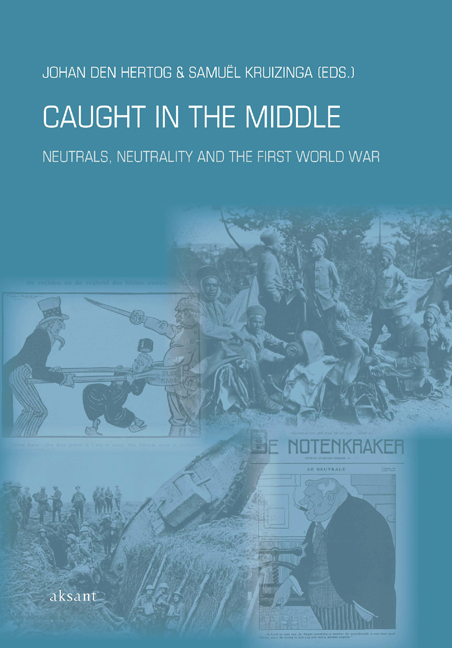Book contents
- Frontmatter
- Contents
- Acknowledgements
- Chapter 1 Introduction
- Chapter 2 Dutch Neutrality and the Value of Legal Argumentation
- Chapter 3 ‘Upon the Neutral Rests the Trusteeship of International Law’: Legal advisers and American unneutrality
- Chapter 4 Spanish Neutrality During the First World War
- Chapter 5 Britain’s Global War and Argentine Neutrality
- Chapter 6 NOT Neutrality: The Dutch government, the Netherlands Oversea Trust Company, and the Entente blockade of Germany, 1914-1918
- Chapter 7 From Parasite to Angel: Narratives of neutrality in the Swedish popular press during the First World War
- Chapter 8 Colour-blind or Clear-sighted Neutrality?: Georg Brandes and the First World War
- Chapter 9 The Hottest Places in Hell?: Finnish and Nordic neutrality from the perspective of French foreign policy, 1900-1940
- Chapter 10 The Other End of Neutrality: The First World War, the League of Nations, and Danish neutrality
- About the Contributors
Chapter 5 - Britain’s Global War and Argentine Neutrality
Published online by Cambridge University Press: 28 January 2021
- Frontmatter
- Contents
- Acknowledgements
- Chapter 1 Introduction
- Chapter 2 Dutch Neutrality and the Value of Legal Argumentation
- Chapter 3 ‘Upon the Neutral Rests the Trusteeship of International Law’: Legal advisers and American unneutrality
- Chapter 4 Spanish Neutrality During the First World War
- Chapter 5 Britain’s Global War and Argentine Neutrality
- Chapter 6 NOT Neutrality: The Dutch government, the Netherlands Oversea Trust Company, and the Entente blockade of Germany, 1914-1918
- Chapter 7 From Parasite to Angel: Narratives of neutrality in the Swedish popular press during the First World War
- Chapter 8 Colour-blind or Clear-sighted Neutrality?: Georg Brandes and the First World War
- Chapter 9 The Hottest Places in Hell?: Finnish and Nordic neutrality from the perspective of French foreign policy, 1900-1940
- Chapter 10 The Other End of Neutrality: The First World War, the League of Nations, and Danish neutrality
- About the Contributors
Summary
Historians who study neutrality during the First World War have long focused on European neutrals and the United States. However, recent writings attempting to create a history of globalization, one that traces the transnational connections critical to historical change over the past few centuries, suggest that it would be worthwhile to attempt to also globalize our history of a war whose name in English, after all, indicates a ‘world’ focus.
The World War affected the South American republics in a variety of ways, changing their foreign trade and investment patterns and calling upon the distant loyalties of populations largely comprised of European immigrants. Perhaps the most important decision that any South American government could make between 1914 and 1918 was its stance towards the European war. Not only did each republic have to decide between neutrality and a declaration of war, they also worked at defining exactly what neutrality or belligerency meant in practice. Some, like Brazil, joined the Allied war effort, others, like Uruguay, broke off relations with Germany without declaring war. In its never-ending rivalry against Brazil, prosperous early twentieth century Argentina could make fair claim to being the greatest or at least the most quickly rising power in South America. This paper examines why this critical republic remained neutral throughout the war, and suggests that the British commercial war was the most crucial determinant in how Argentine authorities confronted the ‘world war.’ The decision of Argentine leaders to join or remain neutral in the European war was integrally related to the war they lived through, the one fought in their country by Britain against local Deutschtum.
Irritating Argentina into maintaining its neutrality
For Britain, the relationship with Argentina had long been its most important in Latin America. Since obtaining independence from Spain in the early nineteenth century, prosperous and booming Argentina became a prime venue for British foreign investments and for British exports. As the historians Peter Cain and Anthony Hopkins famously argue, the British had so penetrated Argentina's economy by the early twentieth century that Argentina should be described as the ultimate example of British informal imperialism, where de facto dominance proved preferable to the less lucrative direct control they wielded in Africa and Asia. Argentine leaders traditionally held a close relationship with Britain.
- Type
- Chapter
- Information
- Caught in the MiddleNeutrals, Neutrality and the First World War, pp. 67 - 84Publisher: Amsterdam University PressPrint publication year: 2012

